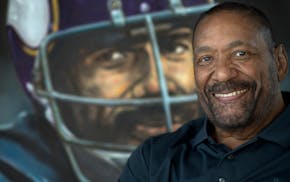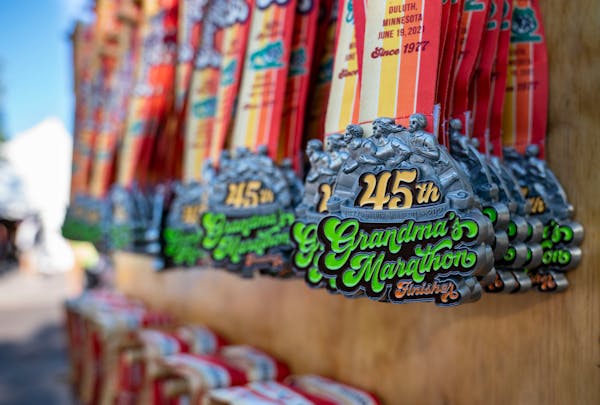Minnesota's changing climate helped push the record-setting temperature that led organizers to call off Sunday's Twin Cities Marathon, the first weather-related cancellation in the race's 40 year history.
Sunday's temperature officially hit a muggy 92 degrees in the Twin Cities, with climate change probably adding "a few degrees of additional heat," said Kenny Blumenfeld, senior climatologist at the state Department of Natural Resources. There's a strong fingerprint of climate change in the autumn surge, he said. The previous record for that day was 87 degrees.
"This was an extraordinary heat event for this time of year," Blumenfeld said. "Typically we don't have 90-degree days in October.
"In the Twin Cities that was the hottest October day on record, which goes back into the 1870s."
The heat wave came on the heels of the warmest September since record-keeping began.
Climate change is fueling the expansion of Minnesota's hot weather season over time, meaning months when 90-degree readings can occur, Blumenfeld said. The spikes will continue in the future, although there's a limit to the trend because the position and strength of the sun in Minnesota's October is the same as it is in March, he noted.
The trend could potentially disrupt the Twin Cities Marathon again. The marathon, which attracts some 20,000 runners, typically takes place in the first week of October — with the most desirable temperature range in the 40s, said Twin Cities Marathon race director Eli Asch. It's been in the 40s only about five times since the marathon started in 1982, however.
When asked if the organization might push the marathon date to later in October, Asch said the 2024 race is confirmed for Oct. 6, the first Sunday of that month. But the organization considers many things when it sets the date — and prime running conditions are one, he said.
Marathons around the country are held with lower temps in mind, with Boston holding its race in April, New York in November and Louisiana in January. But Octobers in Minnesota are becoming warmer. Temperatures have reached into at least the mid-70s on race day in each of the last three years. They've now climbed above 80 degrees four times since 2006, after never reaching that high from the time the marathon began in 1982 until 2006.
Marathons can quickly become dangerous when temperatures are above 80 degrees. More than 300 runners needed emergency medical calls in the 2004 Boston marathon, where temperatures reached 86 degrees. More than 300 were picked up by ambulances in the 2007 Chicago marathon when temperatures rose from the high 70s at the start of the race to 88 degrees by midday.
Climate change has hit Minnesota and the Upper Midwest hardest in the fall and winter, when temperatures have been rising the fastest. It's changing the way people recreate. Minnesota's lakes have lost an average of two weeks of ice coverage since the 1960s. Weak ice early this year caused a slew of fishing derbies and winter festivals to be canceled. The DNR has had to change fishing limits and catch-and-release regulations as more open water has led to more pressure from anglers. The country's largest cross-country ski race, the American Birkebeiner, was canceled in February 2017, because there wasn't snow in northern Wisconsin.
As for runners, they are still absorbing Sunday's missing marathon.
"It feels like Christmas got canceled," said Ellen Szostak, a sales associate at Mill City Running, a running shop and club in northeast Minneapolis. "All of our runners are in this weird place, like, 'What do I do, I just trained for months!'"
Szostak said she's working on a master's degree in public health and quickly connected the cancelation to the climate crisis. She's been working on a project about the environmental impacts of the running shoe industry, with the Low Impact Alliance, a nonprofit founded in South Carolina. Making the shoes emits large amounts of heat-trapping greenhouse gases, she said. That needs to be turned around.
"Maybe it will take a lot of these races being canceled for the brands to notice that we as an industry have an impact on the climate — and if the races are canceled the customers won't be coming to buy the shoe brands," Szostak said.
"It's a conversation we need to be having."

Lewis ends his skid, Castro homers twice as Twins rout A's 10-3

Twins reliever Duran receives recognition for his marvelous May

Lynx roll past Mercury 88-65 to move to 8-0 behind Hiedeman's strong showing

